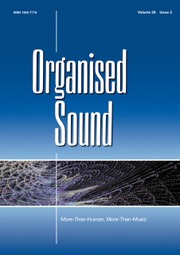No CrossRef data available.
Article contents
Ear Talk Project: Participatory co-composition on YouTube and the Web
Published online by Cambridge University Press: 14 February 2022
Abstract
In this article, we present Ear Talk – a co-composition and live performance project that enables remote music collaboration through technologically mediated systems. The Ear Talk project currently exists in two distinct implementations, one that repurposes YouTube’s live-streaming technology, and one that utilises a stand-alone website. Although Ear Talk was conceived prior to the 2020 COVID-19 pandemic, the necessity for remote collaboration became more apparent during the lockdown, when a vast majority of live events and music concerts were cancelled. The Ear Talk project enables a socially distanced form of online musical collaboration and offers a platform through which to respond to such a crisis, and has grown to be adopted and presented by many different performing groups across the world. In addition to describing the technical implementations of these two systems, we discuss issues that arise from our participatory practice: from musical quality concerns in regard to social aesthetics and artistic ingenuity, to accessibility concerns when designing technologically mediated collaborative systems. Ear Talk embraces continuous musical loops as well as highly asynchronous (i.e., perpetual) collaborative paradigms among remote participants, which raises a conceptual inquiry as to which part of its sonic and social experience constitutes music in the end. Finally, we evaluate performer–audience relationships (i.e., hierarchical versus horizontal interactions) and the efficacy of the Ear Talk systems at enabling socially engaged co-composition.
- Type
- Article
- Information
- Organised Sound , Volume 28 , Issue 1: Socially Engaged Sound Practices, Part 2 , April 2023 , pp. 110 - 121
- Copyright
- © The Author(s), 2022. Published by Cambridge University Press



